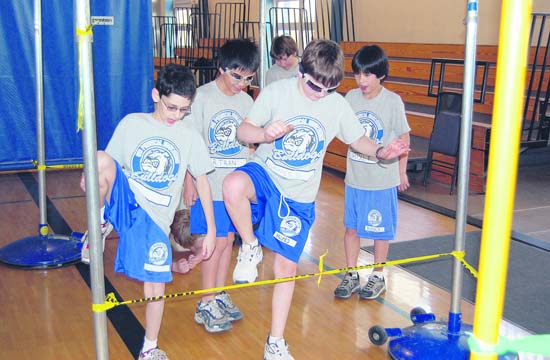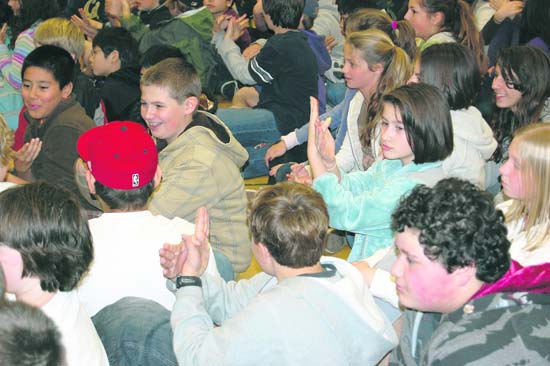| | Published February 18th, 2008
| OIS Diverse Abilities Awareness Week
| | By Jean Follmer |  | | Photo submitted
|
Orinda Intermediate School recently held its annual Diverse Abilities Awareness Week (DAAW). "The purpose of the week is to increase awareness and understanding of different disabilities, and most importantly to see beyond the disabilities and recognize the strengths and abilities of all people. Though it has evolved over the years, the week remains rich in information for the kids and parents," said Diverse Abilities Awareness Week Co-chair Susan Forman in a written statement.
 OIS held activities throughout the week including hands-on stations where 6th graders had the opportunity to "experience a little of what it would be like to have a learning disability." DAAW Co-chair Anna Tague said the stations offered opportunities for auditory, visual and sensory motor experiential learning. The students rotated through the stations in groups of 30. As a visual exercise, the students were asked to read aloud from a page that contained words as seen by a dyslexic person. The experience enabled them to get a sense of the frustration that dyslexic persons can experience when trying to read.
OIS held activities throughout the week including hands-on stations where 6th graders had the opportunity to "experience a little of what it would be like to have a learning disability." DAAW Co-chair Anna Tague said the stations offered opportunities for auditory, visual and sensory motor experiential learning. The students rotated through the stations in groups of 30. As a visual exercise, the students were asked to read aloud from a page that contained words as seen by a dyslexic person. The experience enabled them to get a sense of the frustration that dyslexic persons can experience when trying to read.
 To gain a glimpse of the difficulties people with auditory challenges face, the students participated in an exercise in which the students all wore head phones and listened to instructions from a teacher. Some of the students could hear the teacher so could raise their hands when prompted and others just heard white noise and experienced feeling "left out" because they weren't able to hear the directions.
To gain a glimpse of the difficulties people with auditory challenges face, the students participated in an exercise in which the students all wore head phones and listened to instructions from a teacher. Some of the students could hear the teacher so could raise their hands when prompted and others just heard white noise and experienced feeling "left out" because they weren't able to hear the directions.
 Finally, the students were asked to try to speak with Skittles in their mouths to gain some sense of what it's like to have a sensory motor disability that impacts speech. Through these experiences, the students learned that not all disabilities are "visible." While you can physically see that someone is in a wheelchair you can't "see" many other disabilities because they're invisible to the eye. That doesn't mean, however, that the disabled person does not have real challenges.
Finally, the students were asked to try to speak with Skittles in their mouths to gain some sense of what it's like to have a sensory motor disability that impacts speech. Through these experiences, the students learned that not all disabilities are "visible." While you can physically see that someone is in a wheelchair you can't "see" many other disabilities because they're invisible to the eye. That doesn't mean, however, that the disabled person does not have real challenges.
 OIS held an evening Open House for the first time this year and parents had the opportunity to visit the sensory stations that the students had rotated through. Many location organizations, including the Center for Early Intervention on Deafness (CEID), PAWS for a Cause dog assistance, Sumakids OT and Lighthouse for the Blind hosted tables to share information about deafness, visual impairment, occupational therapy and dog assistance. There was also a wheelchair basketball game that evening: the Bay Area Outreach and Recreational Program (BORP) versus the OIS faculty (also in wheelchairs). While BORP won 71-70, it was only because OIS was given 50 points to start and additional points later in the game. The OIS faculty only scored 5 legitimate points to the 71 points scored by BORP. Tague said the game enabled the audience to see that people with disabilities can still be competitive athletes.
OIS held an evening Open House for the first time this year and parents had the opportunity to visit the sensory stations that the students had rotated through. Many location organizations, including the Center for Early Intervention on Deafness (CEID), PAWS for a Cause dog assistance, Sumakids OT and Lighthouse for the Blind hosted tables to share information about deafness, visual impairment, occupational therapy and dog assistance. There was also a wheelchair basketball game that evening: the Bay Area Outreach and Recreational Program (BORP) versus the OIS faculty (also in wheelchairs). While BORP won 71-70, it was only because OIS was given 50 points to start and additional points later in the game. The OIS faculty only scored 5 legitimate points to the 71 points scored by BORP. Tague said the game enabled the audience to see that people with disabilities can still be competitive athletes.
 The week ended with the sixth graders attending a question and answer style assembly with three disabled panel speakers: Richie Bennett, Lateef McLeod and Jessie Lorenz. Both Bennett and McLeod suffer from cerebral palsy while Lorenz is blind. Bennett is a former OIS student. A UC-Berkeley grad, Bennett is also a former world ranked wheelchair athlete. Bennett has coached wheelchair basketball with BORP since 1998 and is in his first year of graduate work at St. Mary's College in Moraga. McLeod is a writer who holds an undergraduate degree from UC-Berkeley and a graduate degree from Mills College.
The week ended with the sixth graders attending a question and answer style assembly with three disabled panel speakers: Richie Bennett, Lateef McLeod and Jessie Lorenz. Both Bennett and McLeod suffer from cerebral palsy while Lorenz is blind. Bennett is a former OIS student. A UC-Berkeley grad, Bennett is also a former world ranked wheelchair athlete. Bennett has coached wheelchair basketball with BORP since 1998 and is in his first year of graduate work at St. Mary's College in Moraga. McLeod is a writer who holds an undergraduate degree from UC-Berkeley and a graduate degree from Mills College.
 Lorenz is a professional athlete who participated in both the 2004 and 2008 Paralympics on the US Women's Goal ball team. She has earned a World Championship title and numerous medals in the sport. In 2008, she carried the Olympic Torch as it made its way through San Francisco and won her second consecutive Paralympic Games medal with a gold in Beijing. Lorenz is Director of Public Policy for the Lighthouse for the Blind and Visually Impaired in San Francisco. She also helped bring accessible crossing signals to San Francisco intersections.
Lorenz is a professional athlete who participated in both the 2004 and 2008 Paralympics on the US Women's Goal ball team. She has earned a World Championship title and numerous medals in the sport. In 2008, she carried the Olympic Torch as it made its way through San Francisco and won her second consecutive Paralympic Games medal with a gold in Beijing. Lorenz is Director of Public Policy for the Lighthouse for the Blind and Visually Impaired in San Francisco. She also helped bring accessible crossing signals to San Francisco intersections.
 Lorenz told the students it's never been physical boundaries that have made her life difficult, but attitudes and misconceptions. Lateef is only able to speak through a computer. He told the crowd that people frequently judge his intelligence because he is unable to speak without the computer.
Lorenz told the students it's never been physical boundaries that have made her life difficult, but attitudes and misconceptions. Lateef is only able to speak through a computer. He told the crowd that people frequently judge his intelligence because he is unable to speak without the computer.
 Tague said the fact that Bennett experienced life in a wheelchair in the halls of OIS really resonated with the students. After the assembly was over, 30-40 kids rushed the stage to speak to the panelists. Although they had to get to their next class, Tague said the kids "really wanted to stay and have more time with them."
Tague said the fact that Bennett experienced life in a wheelchair in the halls of OIS really resonated with the students. After the assembly was over, 30-40 kids rushed the stage to speak to the panelists. Although they had to get to their next class, Tague said the kids "really wanted to stay and have more time with them."
 OIS has been holding Diverse Abilities Awareness Week for over a decade as part of its Character Education program.
OIS has been holding Diverse Abilities Awareness Week for over a decade as part of its Character Education program.

|
 | | Photo submitted
|
| | | |
